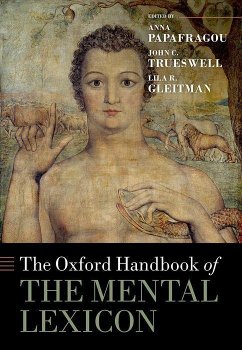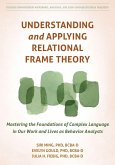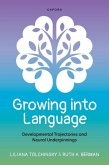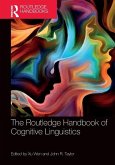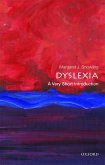The Oxford Handbook of the Mental Lexicon
Herausgeber: Papafragou, Anna; Gleitman, Lila R; Trueswell, John C
The Oxford Handbook of the Mental Lexicon
Herausgeber: Papafragou, Anna; Gleitman, Lila R; Trueswell, John C
- Gebundenes Buch
- Merkliste
- Auf die Merkliste
- Bewerten Bewerten
- Teilen
- Produkt teilen
- Produkterinnerung
- Produkterinnerung
This volume brings together the latest research from leading scholars on the mental lexicon - the representation of language in the mind/brain at the level of individual words or sub-words. It spans multiple disciplines, highlights important advances in the study of the mental lexicon, and identifies areas of debate and future research.
Andere Kunden interessierten sich auch für
![The Oxford Handbook of Psycholinguistics The Oxford Handbook of Psycholinguistics]() The Oxford Handbook of Psycholinguistics173,99 €
The Oxford Handbook of Psycholinguistics173,99 €![Understanding and Applying Relational Frame Theory Understanding and Applying Relational Frame Theory]() Evelyn GouldUnderstanding and Applying Relational Frame Theory84,99 €
Evelyn GouldUnderstanding and Applying Relational Frame Theory84,99 €![Language Acquisition by Children Language Acquisition by Children]() Helen GoodluckLanguage Acquisition by Children38,99 €
Helen GoodluckLanguage Acquisition by Children38,99 €![Growing Into Language Growing Into Language]() Liliana Tolchinsky (Professor Emerita, Linguistics, Professor EmeriGrowing Into Language130,99 €
Liliana Tolchinsky (Professor Emerita, Linguistics, Professor EmeriGrowing Into Language130,99 €![The Routledge Handbook of Theoretical and Experimental Sign Language Research The Routledge Handbook of Theoretical and Experimental Sign Language Research]() The Routledge Handbook of Theoretical and Experimental Sign Language Research227,99 €
The Routledge Handbook of Theoretical and Experimental Sign Language Research227,99 €![The Routledge Handbook of Cognitive Linguistics The Routledge Handbook of Cognitive Linguistics]() The Routledge Handbook of Cognitive Linguistics49,99 €
The Routledge Handbook of Cognitive Linguistics49,99 €![Dyslexia Dyslexia]() Margaret SnowlingDyslexia17,99 €
Margaret SnowlingDyslexia17,99 €-
-
-
This volume brings together the latest research from leading scholars on the mental lexicon - the representation of language in the mind/brain at the level of individual words or sub-words. It spans multiple disciplines, highlights important advances in the study of the mental lexicon, and identifies areas of debate and future research.
Produktdetails
- Produktdetails
- Oxford Handbooks
- Verlag: Oxford University Press
- Seitenzahl: 816
- Erscheinungstermin: 14. April 2022
- Englisch
- Abmessung: 244mm x 170mm x 51mm
- Gewicht: 1600g
- ISBN-13: 9780198845003
- ISBN-10: 0198845006
- Artikelnr.: 62535695
- Herstellerkennzeichnung
- Libri GmbH
- Europaallee 1
- 36244 Bad Hersfeld
- gpsr@libri.de
- Oxford Handbooks
- Verlag: Oxford University Press
- Seitenzahl: 816
- Erscheinungstermin: 14. April 2022
- Englisch
- Abmessung: 244mm x 170mm x 51mm
- Gewicht: 1600g
- ISBN-13: 9780198845003
- ISBN-10: 0198845006
- Artikelnr.: 62535695
- Herstellerkennzeichnung
- Libri GmbH
- Europaallee 1
- 36244 Bad Hersfeld
- gpsr@libri.de
Anna Papafragou is a Professor in the Department of Linguistics at the University of Pennsylvania and the director of the University's interdisciplinary graduate program in Language and Communication Sciences. Her research focuses on how children acquire meaning in language, how language is used and understood, and how language interfaces with human perception and cognition. She is an elected Fellow of the Association for Psychological Science and serves on the Governing Board of the Cognitive Science Society. John C. Trueswell is a Professor in the Department of Psychology at the University of Pennsylvania and the co-director of the University's MindCORE initiative in Integrative Language Science and Technology. His research focuses on understanding how children develop the ability to process language in real-time, and how this ability interacts with the acquisition of language. He is an elected fellow of the Association for Psychological Science, the American Association for the Advancement of Science, and the Cognitive Science Society. Lila R. Gleitman is a Professor Emerita of Psychology and (by secondary appointment) Linguistics at the University of Pennsylvania. She has conducted foundational work on language acquisition, and the relationship between language and other cognitive systems. She is an elected member of the National Academy of Sciences, an elected fellow of the American Association for the Advancement of Science, a Fyssen Foundation Laureate, and a winner of the Rumelhart Prize from the Cognitive Science Society.
* 1: Anna Papafragou, John C. Trueswell, and Lila R. Gleitman:
Introduction
* Part I: Representing the Mental Lexicon
* Part Ia: Form
* 2: Eric Bakovic, Jeffrey Heinz, and Jonathan Rawski: Phonological
abstraction in the mental lexicon
* 3: Ruaridh Purse, Meredith Tamminga, and Yosiane White: Phonological
variation and lexical form
* 4: David Poeppel and Yue Su: Neural encoding of speech and word forms
* Part Ib: Meaning
* 5: David Embick, Ava Creemers, and Amy J. Goodwin Davies: Morphology
and the mental lexicon: Three questions about decomposition
* 6: Artemis Alexiadou: Syntax and the lexicon
* 7: Ray Jackendoff: Lexical semantics
* 8: Valentine Hacquard: Logic and the lexicon: Insights from modality
* Part Ic: Interfaces and Boundaries
* 9: Florian Schwarz and Jérémy Zehr: Pragmatics and the lexicon
* 10: Kyle Mahowald, Isabelle Dautriche, Mika Braginsky, and Edward
Gibson: Efficient communication and the organization of the lexicon
* 11: Gala Stojnic and Ernie Lepore: Compositionality of concepts
* 12: Barbara Landau: Language and thought: The lexicon and beyond
* Part II: Acquiring the Mental Lexicon
* Part IIa: Form
* 13: Daniel Swingley: Infants' learning of speech sounds and word
forms
* 14: Sarah C. Creel: Learning words amidst speech sound variability
* Part IIb: Meaning
* 15: Katherine Demuth: How learners move from sound to morphology
* 16: Charles Yang: Systematicity and arbitrariness in language:
Saussurean rhapsody
* 17: Jeffrey Lidz: Children's use of syntax in word learning
* 18: Lila R. Gleitman and John C. Trueswell: Easy words: Reference
resolution in a malevolent referent world
* 19: Stephen Crain: Early logic and language
* Part IIc: Interfaces and Boundaries
* 20: Myrto Grigoroglou and Anna Papafragou: Contributions of
pragmatics to word learning and interpretation
* 21: Christine E. Potter and Casey Lew-Williams: Differences in
vocabulary growth across groups and individuals
* Part III: Accessing the Mental Lexicon
* Part IIIa: Via Form
* 22: James S. Magnuson and Anne Marie Crinnion: Spoken word
recognition
* 23: Jennifer Rodd: Word meaning access: The one-to-many mapping from
form to meaning
* 24: Rebecca Treiman and Brett Kessler: Learning and using written
word forms
* Part IIIb: Via Meaning
* 25: Oriana Kilbourn-Ceron and Matthew Goldrick: The dynamics of word
production
* 26: Nazbanou Nozari: The neural basis of word production
* Part IIIc: Interfaces and Boundaries
* 27: Maria Mercedes Piñango: The structure of the lexical item and
sentence-meaning composition
* 28: Judith Kroll, Kinsey Bice, Mona Roxana Botezatu, and Megan
Zirnstein: On the dynamics of lexical access in two or more languages
* 29: Rachel I. Mayberry and Beatrijs Wille: Lexical representation and
access in sign languages
* 30: Daniel Mirman and Erica L. Middleton: Disorders of lexical access
and production
Introduction
* Part I: Representing the Mental Lexicon
* Part Ia: Form
* 2: Eric Bakovic, Jeffrey Heinz, and Jonathan Rawski: Phonological
abstraction in the mental lexicon
* 3: Ruaridh Purse, Meredith Tamminga, and Yosiane White: Phonological
variation and lexical form
* 4: David Poeppel and Yue Su: Neural encoding of speech and word forms
* Part Ib: Meaning
* 5: David Embick, Ava Creemers, and Amy J. Goodwin Davies: Morphology
and the mental lexicon: Three questions about decomposition
* 6: Artemis Alexiadou: Syntax and the lexicon
* 7: Ray Jackendoff: Lexical semantics
* 8: Valentine Hacquard: Logic and the lexicon: Insights from modality
* Part Ic: Interfaces and Boundaries
* 9: Florian Schwarz and Jérémy Zehr: Pragmatics and the lexicon
* 10: Kyle Mahowald, Isabelle Dautriche, Mika Braginsky, and Edward
Gibson: Efficient communication and the organization of the lexicon
* 11: Gala Stojnic and Ernie Lepore: Compositionality of concepts
* 12: Barbara Landau: Language and thought: The lexicon and beyond
* Part II: Acquiring the Mental Lexicon
* Part IIa: Form
* 13: Daniel Swingley: Infants' learning of speech sounds and word
forms
* 14: Sarah C. Creel: Learning words amidst speech sound variability
* Part IIb: Meaning
* 15: Katherine Demuth: How learners move from sound to morphology
* 16: Charles Yang: Systematicity and arbitrariness in language:
Saussurean rhapsody
* 17: Jeffrey Lidz: Children's use of syntax in word learning
* 18: Lila R. Gleitman and John C. Trueswell: Easy words: Reference
resolution in a malevolent referent world
* 19: Stephen Crain: Early logic and language
* Part IIc: Interfaces and Boundaries
* 20: Myrto Grigoroglou and Anna Papafragou: Contributions of
pragmatics to word learning and interpretation
* 21: Christine E. Potter and Casey Lew-Williams: Differences in
vocabulary growth across groups and individuals
* Part III: Accessing the Mental Lexicon
* Part IIIa: Via Form
* 22: James S. Magnuson and Anne Marie Crinnion: Spoken word
recognition
* 23: Jennifer Rodd: Word meaning access: The one-to-many mapping from
form to meaning
* 24: Rebecca Treiman and Brett Kessler: Learning and using written
word forms
* Part IIIb: Via Meaning
* 25: Oriana Kilbourn-Ceron and Matthew Goldrick: The dynamics of word
production
* 26: Nazbanou Nozari: The neural basis of word production
* Part IIIc: Interfaces and Boundaries
* 27: Maria Mercedes Piñango: The structure of the lexical item and
sentence-meaning composition
* 28: Judith Kroll, Kinsey Bice, Mona Roxana Botezatu, and Megan
Zirnstein: On the dynamics of lexical access in two or more languages
* 29: Rachel I. Mayberry and Beatrijs Wille: Lexical representation and
access in sign languages
* 30: Daniel Mirman and Erica L. Middleton: Disorders of lexical access
and production
* 1: Anna Papafragou, John C. Trueswell, and Lila R. Gleitman:
Introduction
* Part I: Representing the Mental Lexicon
* Part Ia: Form
* 2: Eric Bakovic, Jeffrey Heinz, and Jonathan Rawski: Phonological
abstraction in the mental lexicon
* 3: Ruaridh Purse, Meredith Tamminga, and Yosiane White: Phonological
variation and lexical form
* 4: David Poeppel and Yue Su: Neural encoding of speech and word forms
* Part Ib: Meaning
* 5: David Embick, Ava Creemers, and Amy J. Goodwin Davies: Morphology
and the mental lexicon: Three questions about decomposition
* 6: Artemis Alexiadou: Syntax and the lexicon
* 7: Ray Jackendoff: Lexical semantics
* 8: Valentine Hacquard: Logic and the lexicon: Insights from modality
* Part Ic: Interfaces and Boundaries
* 9: Florian Schwarz and Jérémy Zehr: Pragmatics and the lexicon
* 10: Kyle Mahowald, Isabelle Dautriche, Mika Braginsky, and Edward
Gibson: Efficient communication and the organization of the lexicon
* 11: Gala Stojnic and Ernie Lepore: Compositionality of concepts
* 12: Barbara Landau: Language and thought: The lexicon and beyond
* Part II: Acquiring the Mental Lexicon
* Part IIa: Form
* 13: Daniel Swingley: Infants' learning of speech sounds and word
forms
* 14: Sarah C. Creel: Learning words amidst speech sound variability
* Part IIb: Meaning
* 15: Katherine Demuth: How learners move from sound to morphology
* 16: Charles Yang: Systematicity and arbitrariness in language:
Saussurean rhapsody
* 17: Jeffrey Lidz: Children's use of syntax in word learning
* 18: Lila R. Gleitman and John C. Trueswell: Easy words: Reference
resolution in a malevolent referent world
* 19: Stephen Crain: Early logic and language
* Part IIc: Interfaces and Boundaries
* 20: Myrto Grigoroglou and Anna Papafragou: Contributions of
pragmatics to word learning and interpretation
* 21: Christine E. Potter and Casey Lew-Williams: Differences in
vocabulary growth across groups and individuals
* Part III: Accessing the Mental Lexicon
* Part IIIa: Via Form
* 22: James S. Magnuson and Anne Marie Crinnion: Spoken word
recognition
* 23: Jennifer Rodd: Word meaning access: The one-to-many mapping from
form to meaning
* 24: Rebecca Treiman and Brett Kessler: Learning and using written
word forms
* Part IIIb: Via Meaning
* 25: Oriana Kilbourn-Ceron and Matthew Goldrick: The dynamics of word
production
* 26: Nazbanou Nozari: The neural basis of word production
* Part IIIc: Interfaces and Boundaries
* 27: Maria Mercedes Piñango: The structure of the lexical item and
sentence-meaning composition
* 28: Judith Kroll, Kinsey Bice, Mona Roxana Botezatu, and Megan
Zirnstein: On the dynamics of lexical access in two or more languages
* 29: Rachel I. Mayberry and Beatrijs Wille: Lexical representation and
access in sign languages
* 30: Daniel Mirman and Erica L. Middleton: Disorders of lexical access
and production
Introduction
* Part I: Representing the Mental Lexicon
* Part Ia: Form
* 2: Eric Bakovic, Jeffrey Heinz, and Jonathan Rawski: Phonological
abstraction in the mental lexicon
* 3: Ruaridh Purse, Meredith Tamminga, and Yosiane White: Phonological
variation and lexical form
* 4: David Poeppel and Yue Su: Neural encoding of speech and word forms
* Part Ib: Meaning
* 5: David Embick, Ava Creemers, and Amy J. Goodwin Davies: Morphology
and the mental lexicon: Three questions about decomposition
* 6: Artemis Alexiadou: Syntax and the lexicon
* 7: Ray Jackendoff: Lexical semantics
* 8: Valentine Hacquard: Logic and the lexicon: Insights from modality
* Part Ic: Interfaces and Boundaries
* 9: Florian Schwarz and Jérémy Zehr: Pragmatics and the lexicon
* 10: Kyle Mahowald, Isabelle Dautriche, Mika Braginsky, and Edward
Gibson: Efficient communication and the organization of the lexicon
* 11: Gala Stojnic and Ernie Lepore: Compositionality of concepts
* 12: Barbara Landau: Language and thought: The lexicon and beyond
* Part II: Acquiring the Mental Lexicon
* Part IIa: Form
* 13: Daniel Swingley: Infants' learning of speech sounds and word
forms
* 14: Sarah C. Creel: Learning words amidst speech sound variability
* Part IIb: Meaning
* 15: Katherine Demuth: How learners move from sound to morphology
* 16: Charles Yang: Systematicity and arbitrariness in language:
Saussurean rhapsody
* 17: Jeffrey Lidz: Children's use of syntax in word learning
* 18: Lila R. Gleitman and John C. Trueswell: Easy words: Reference
resolution in a malevolent referent world
* 19: Stephen Crain: Early logic and language
* Part IIc: Interfaces and Boundaries
* 20: Myrto Grigoroglou and Anna Papafragou: Contributions of
pragmatics to word learning and interpretation
* 21: Christine E. Potter and Casey Lew-Williams: Differences in
vocabulary growth across groups and individuals
* Part III: Accessing the Mental Lexicon
* Part IIIa: Via Form
* 22: James S. Magnuson and Anne Marie Crinnion: Spoken word
recognition
* 23: Jennifer Rodd: Word meaning access: The one-to-many mapping from
form to meaning
* 24: Rebecca Treiman and Brett Kessler: Learning and using written
word forms
* Part IIIb: Via Meaning
* 25: Oriana Kilbourn-Ceron and Matthew Goldrick: The dynamics of word
production
* 26: Nazbanou Nozari: The neural basis of word production
* Part IIIc: Interfaces and Boundaries
* 27: Maria Mercedes Piñango: The structure of the lexical item and
sentence-meaning composition
* 28: Judith Kroll, Kinsey Bice, Mona Roxana Botezatu, and Megan
Zirnstein: On the dynamics of lexical access in two or more languages
* 29: Rachel I. Mayberry and Beatrijs Wille: Lexical representation and
access in sign languages
* 30: Daniel Mirman and Erica L. Middleton: Disorders of lexical access
and production

